Week One
To help inspire us during the Church’s grace-filled season of Lent, Newman University community members share their reflections on the Mass readings for each of day of Lent. We begin with Ash Wednesday and will continue through Easter Sunday.
You can visit newmanu.edu/lent to read today’s reflection.
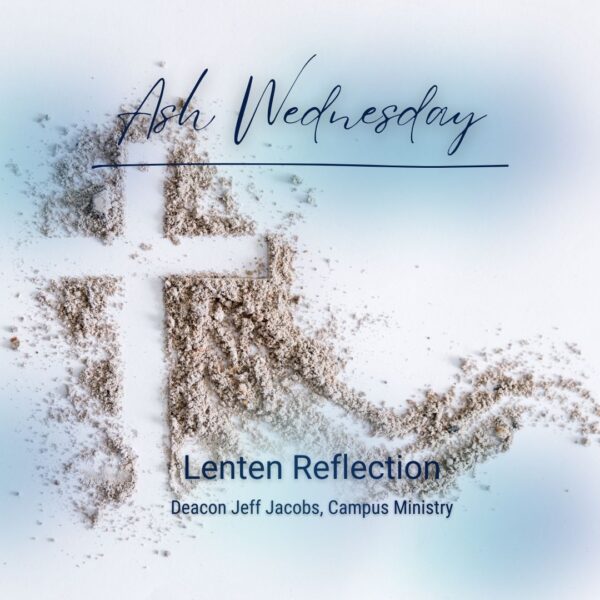
Feb. 14 Ash Wednesday – Joel 2:12-18; 2 Cor 5:20-6:2; Matthew 6:1-6, 16-18
Being Catholic on Ash Wednesday
Deacon Jeff Jacobs, Campus Ministry
Growing up Catholic I remember so well as a child trying to explain to my public school, non-Catholic classmates why I had a black smudge on my forehead. Quite the challenge to explain as a kid.
Today is Ash Wednesday, the beginning of Lent. We will receive ashes on our forehead. The ashes will come from the burning of dried, brown and dead palm branches; much like our souls that can become dried and dying from sinful behavior. This is our opportunity for renewal and cleansing.
St. Paul writes, “Do not receive the grace of God in vain.” During Lent, we do not want to receive the grace of God in vain.
Jesus in the Gospel of Matthew spoke of humble prayer, fasting and giving to the poor. What a perfect time for all of us to be renewed and increase our prayer life, fast and take care of the poor with our time, talent and treasure. Oh, how I wish I knew this when trying to answer my classmates, why I had a black smudge on my forehead.
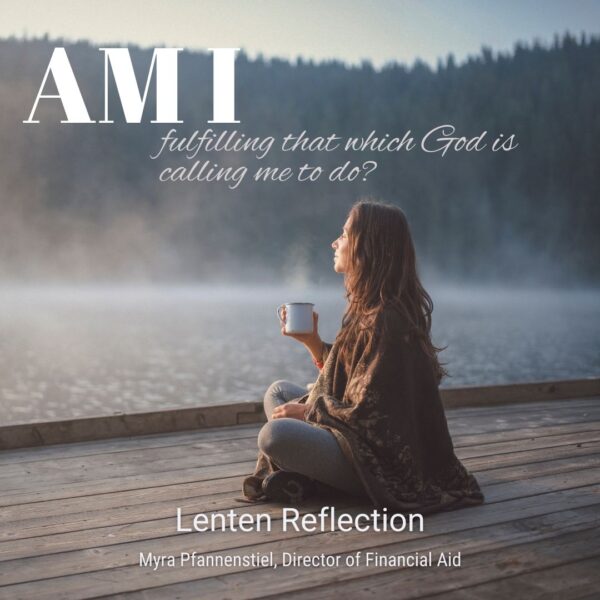
Feb. 15 Thursday after Ash Wednesday – Deuteronomy 30:15-20; Luke 9:22-25
Myra Pfannenstiel, director of Financial Aid
Within these verses from Luke, Jesus foretells his forthcoming rejection, suffering, death and resurrection. He extends an invitation to all, urging us to shoulder our daily challenges and walk in his footsteps. I frequently ponder the nature of my own trials, questioning whether I am wholeheartedly embracing them to align myself with Jesus. Am I leading a purposeful life rooted in self-discovery and a meaningful relationship with God? Is there a divine calling prompting me to dedicate my life to serving others with genuine compassion? Am I fulfilling that which God is calling me to do?
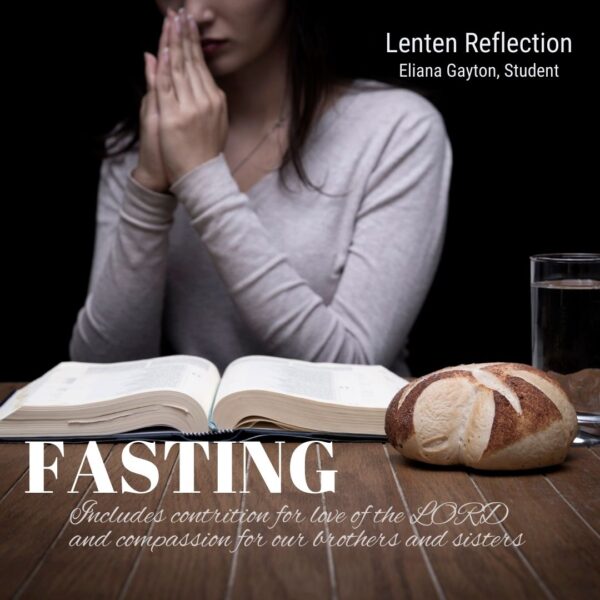
Feb. 16 Friday after Ash Wednesday – Isaiah 58:1-9; Matthew 9:14-15
Eliana Gayton, student
In Isaiah 58:1-9 we read, “Your fasting ends in quarreling and strife… you cannot fast as you do today and expect our voice to be heard on high… Is this what you call a fast?” There is danger in turning the gift of sacrifice into a very self-centered thing. We can become cynical or prideful when sacrifice is not focused on glory of God and service of our brothers and sisters. The Lord asks us about fasting, “Is it not to share your food with the hungry and to provide the poor wanderer with shelter?” Fasting is sacrifice, which includes both contrition for love of the Lord and compassion for our brothers and sisters.

Feb. 17 Saturday after Ash Wednesday – Isaiah 58:9b-14; Luke 5:27-32
Kristin Martin ‘14
In Luke, Jesus responds to the question, “Why do you eat and drink with tax collectors and sinners?” with these words, “Those who are healthy do not need a physician, but the sick do.
I have not come to call the righteous to repentance but sinners.”
Lord, let me not be so prideful that I forget that I, too, am sick. My efforts at holiness do not change my need for the Divine Physician. Let the awareness of my need for divine healing drive me to solidarity with my fellow tax collectors and sinners.
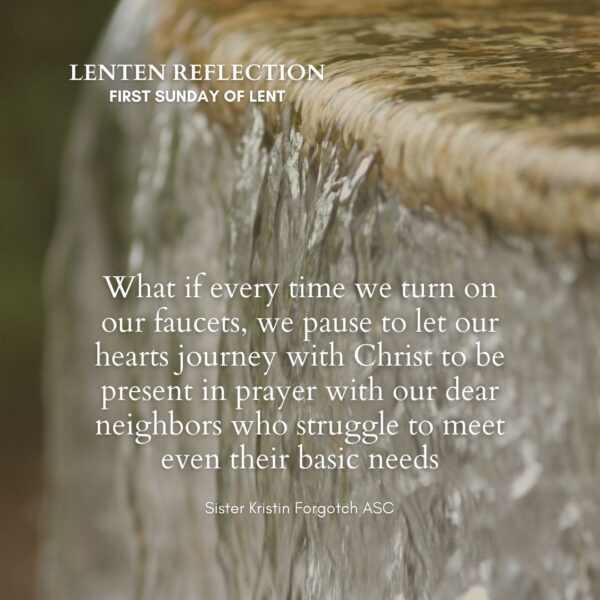
Feb. 18 First Sunday of Lent – Genesis 9:8-15; First Peter 3:18-22; Mark 1:12-15
Sister Kristin Forgotch, ASC
Where will the flowing waters lead us today and through the rest of our Lenten river?
The waters in today’s readings take us on a journey with water from the ark to baptism, to the desert where we thirst for more. Many days we turn on the faucet first thing in the morning to wash our face and brush our teeth and repeat these steps to end our day. There are parts of our country and world where the access to potable water takes many more steps than simply turning on the faucet. What if every time we turn on our faucets, we pause to let our hearts journey with Christ to be present in prayer with our dear neighbors who struggle to meet even their basic needs? May our prayers and pauses this day and every day forward be the living waters of hope and love as we continue to be in connection and communion with our dear neighbor.
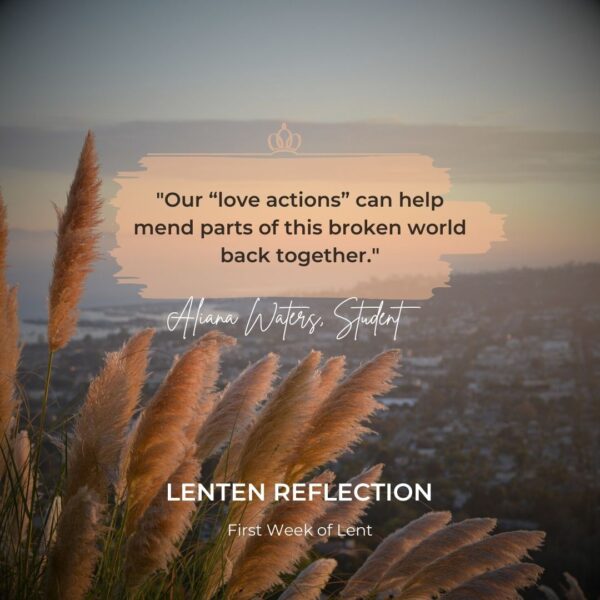
Feb. 19 Monday, First Week of Lent – Leviticus 19:1-2, 11-18; Matthew 25:31-46
Aliana Waters, student
Preface: As the season of Lent begins, allow yourselves to seek after God’s love and the command to love placed on us all, so not to forget the perfect love Jesus displayed on the cross.
We are called to love God first and foremost, then to love our neighbors, including our enemies. (Matthew 5:44) It is impossible to love, unless we fully surrender, allowing Christ to make us a new creation and be reconciled to the one whose name is love (1 John 4:8). Today’s readings both demonstrate instances where a person is given a command or commands to follow and then judged based on ability to live up to the task. Failure will always arise unless our behavior is motivated by God’s love. Through that kind of love, we have passion to help and care for the less fortunate. Our “love actions” can help mend parts of this broken world back together.
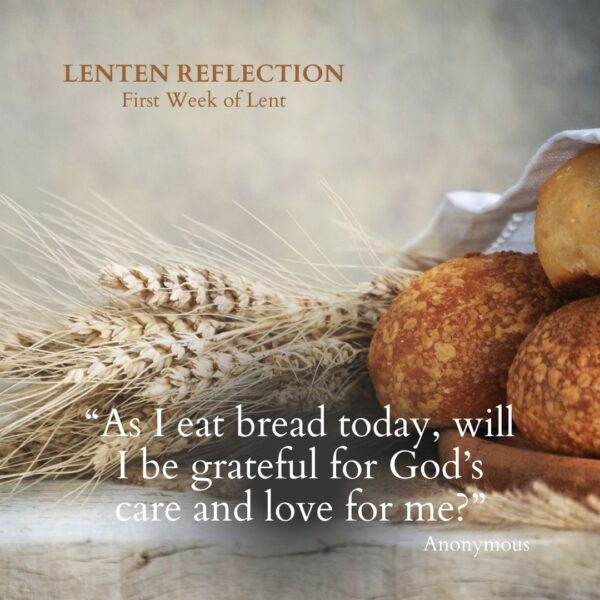
Feb. 20 Tuesday, First Week of Lent – Isaiah 55:10-11; Matthew 6:7-15
Anonymous
Bread – the staple food of almost every country in some form, a food sustaining life when almost nothing else is available. A symbol of culture and religious rituals and spirituality. Both readings today speak of bread – “giving seed to the sower and bread to those who eat” (Isaiah) and “give us this day our daily bread” (Matthew).
Lent is a special time to daily “eat” the bread of the living word of God that “goes forth from my mouth; it shall not return to me empty but it shall accomplish what I mean it to do.” As I eat bread today, will I be grateful for God’s care and love for me? Will I make time this Lent to read, even for five minutes, the nourishing bread of Sacred Scripture?
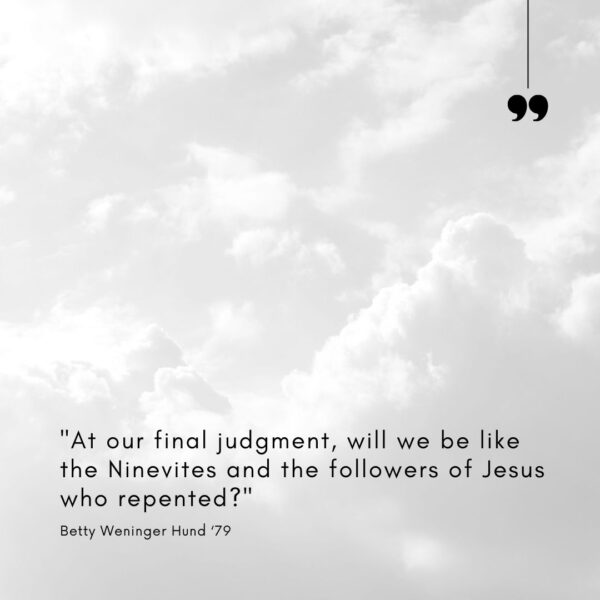
Feb. 21 Wednesday, First Week of Lent – Jonah 3:1-10; Luke 11:29-32
Betty Weninger Hund ‘79
Most of us remember the biblical story of Jonah being swallowed by the whale because he refused God’s demand to visit Nineveh, a pagan city known for its wickedness. Jonah fled on a ship, was thrown overboard during a storm and swallowed by a large fish for three days. Jonah prayed to God to have mercy on him. God did and “commanded the fish to spew Jonah upon the shore,” where today’s reading of Jonah begins. Jonah obeyed God’s command and traveled through Nineveh prophesying it would be destroyed in 40 days if the people did not repent. Fortunately, the entire nation repented.
In today’s Gospel, Jesus is preaching to a large crowd. Instead of celebrating the arrival of the Messiah, the people cast doubt on what Jesus was saying and demanded a sign. Jesus said, “This generation is an evil generation, it seeks a sign, but no sign will be given it, except the sign of Jonah.” As Jonah preached to the Ninevites about repentance, Jesus was preaching the same.
At our final judgment, will we be like the Ninevites and the followers of Jesus who repented?
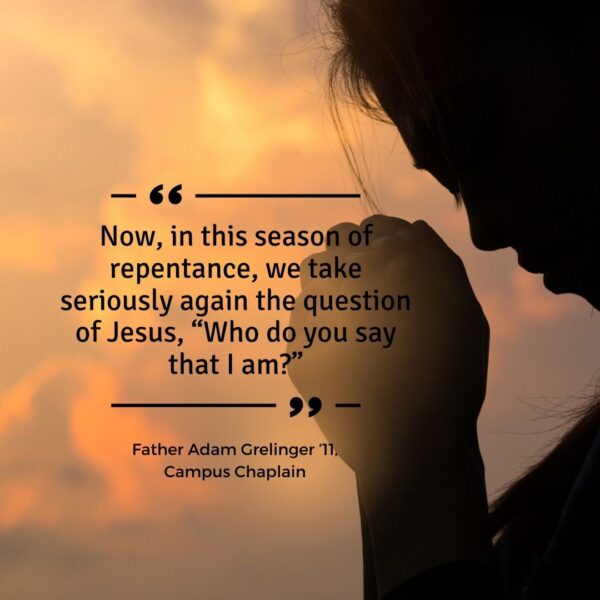
Feb. 22 Thursday, Feast of the Chair of St. Peter – First Letter of St. Peter 5:1-4; Matthew 16:13-19
Father Adam Grelinger ’11, campus chaplain
Today the Church celebrates the feast of the Chair of Saint Peter. Yes, a chair, or “cathedra,” from which where we get the word “cathedral.” It is a celebration of the “seat of authority” Jesus entrusted to Peter and his successors (the popes); a seat that symbolizes the immovable rock of faith on which Jesus builds his Church. This seat of authority is not for Peter to “lord it over” but to “tend the flock of God” and to faithfully witness through the ages that Jesus is “the Christ, the Son of the living God.”
Individual popes through history may have served this office well or poorly, but the chair remains and the proclamation of the truth of Christ continues to our day. Now, in this season of repentance and turning our lives back to the Lord, we take seriously again the question of Jesus, “Who do you say that I am?”
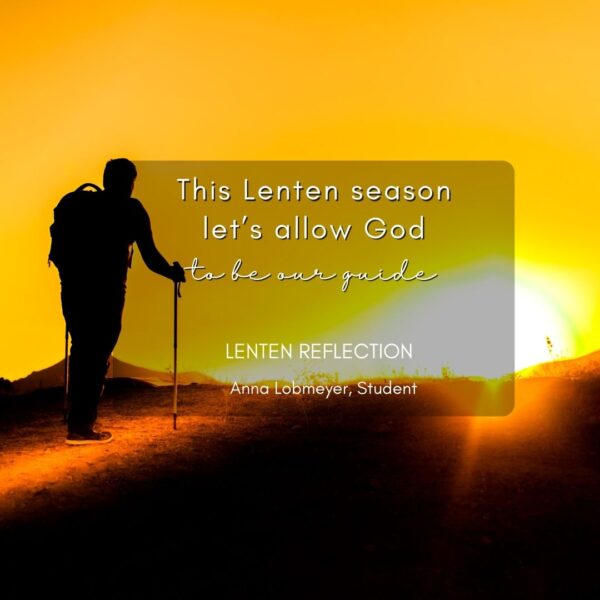
Feb. 23 Friday, First Week of Lent – Ezekiel 18:21-18; Matthew 5:20-26
Anna Lobmeyer, student
Today’s readings take us on a journey, the first from bad to good – if the wicked person turns away from all the sins committed … he/she shall surely live. The Gospel takes us from good to better – leave your gift at the altar, go first and be reconciled with your brother or sister, and then come and offer your gift. Realizing we need to reroute doesn’t mean we are failures; it means that we can go somewhere better. God wants us to journey ever closer to him, and it’s natural that a journey starts far from its destination. Even if we are already on the path for something good (like the offering), there might be something more important (like reconciliation) that God is asking of us. This Lenten season let’s allow God to be our guide.
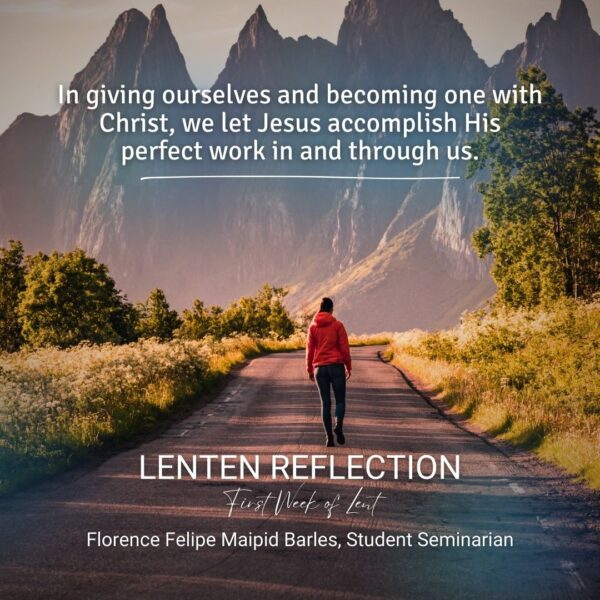
Feb. 24 Saturday, First Week of Lent – Deuteronomy 26:16-19; Matthew 5:43-48
Florence Felipe Maipid Barles, student seminarian
In the Scriptures, we are given a unique invitation to live out our Newman mission to transform society for the common good of all. The Lord invites us to be His people, observe the commandments, and to be perfect – not as the world defines it, but “as the heavenly Father is.”
The surest way to transform society for the common good is to first and foremost let Jesus Christ transform us and dwell in us, to let Jesus love, heal, fulfill and make us perfect, to rely on and cling to Christ who is Himself perfect. To let Jesus Christ transform and dwell in us, we must faithfully devote time to foster a relationship with Christ in prayer, the Sacraments, Scripture, and the Church’s teachings. In giving ourselves and becoming one with Christ, we let Jesus accomplish His perfect work in and through us. In this way, we can do our part to help transform society into the Kingdom of Heaven right here on earth.

